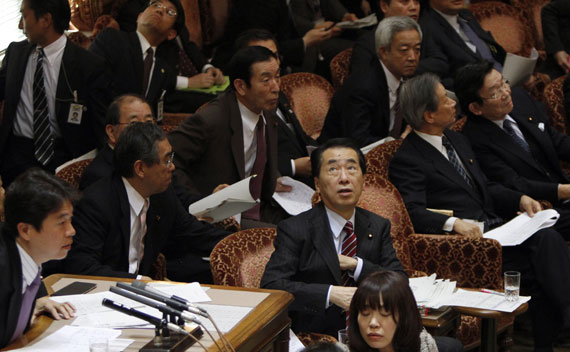Warning: Political Bickering Dangerous to Japan’s Health
More on:

It has been a month since the terrible earthquake/tsunami shock of March 11. Across the country, there is a palpable desire to reach out to the Tohoku region, and to bring the country together.
But politics are returning to Tokyo. Last Sunday was the first of two sets of local elections scheduled for April. Before the crisis, the Kan government was weakened as it sought to pass the national budget. For the LDP and the New Komeito, opposition parties that had formed the coalition government up until the DPJ’s victory in 2009, these elections posed an opportunity to demonstrate their electoral strength, and challenge the prime minister.
The shock of March 11 seemed to put an end to the endless game of parliamentary politicking. But last Sunday’s local elections have rekindled the addiction among Japan’s political junkies. Local elections have long been important indices of regional differences of opinion with Tokyo, and with the notable exception of the New Komeito, there has always been a healthy skepticism expressed in local elections that make it difficult to read them as a direct reflection of the popularity of national political parties or leaders. I will try to make sense of what they say about the public’s demands for governance after the second round of elections later this month.
After the first set of elections, one thing seems clear: the Japanese public does not support the partisan bickering that was going on prior to Japan’s disaster. Polling data revealed a serious drop in support for both of Japan’s major parties, the DPJ and the LDP. The quarreling came to a halt once disaster struck. In the early weeks after the March 11 disaster, the DPJ and the LDP put aside their differences. The LDP immediately dropped its opposition to the current fiscal year budget. Prime Minister Kan offered the LDP leadership slots in his government so they could work together in a unity cabinet.
A month later, however, the bickering in Tokyo has re-emerged. Within the DPJ, former prime minister Hatoyama and former party secretary general Ozawa openly criticized the prime minister, and made a very public point of demonstrating their willingness to meet with the LDP. Talk of a grand coalition still permeates the media. Rumor has it that this conversation is more about who should get the prime minister’s slot than about how to design Japan’s future.
Old habits die hard, yet there seems little appetite among the Japanese public for narrow partisan politics. The four prefectures that were hardest hit could not hold elections, and my guess is that this regular exercise in democracy is the furthest thing from people’s minds as the task of meeting basic needs for shelter, food and health care dominant the public agenda. The on-going nuclear crisis demands serious attention, and the government cannot afford to take its gaze off of the need for constant monitoring of the impact on the country’s energy and food supply.
Today, it is not who should be in the spotlight, but rather what every individual can contribute that is the theme of the national conversation on how to move forward. Japan’s local leaders understand this, and indeed see themselves as being on the frontline of the national recovery effort. Despite their shock and loss, the prefectural governors and municipal mayors in Tohoku clearly articulate their needs and their agendas for rebuilding with their communities. Those outside of Tohoku—including the governors who came through this last election—remind their constituents that the events of March 11 could just as easily have happened to their prefecture or municipality.
This is Japan’s challenge, and national legislators—so enamored with their own electoral standing of late—must put themselves in the same frame of mind. The events of March 11 have created complex and difficult challenges for the Japanese nation. All of Japan’s leaders—in and outside of government—are beginning to come together to formulate the road forward. Business leaders, NGOs, local community leaders and Japan’s leading experts in science and health are all contributing to the debate.
This means Japan’s politicians will have to reach higher, and deliver more. They will have to kick the habit of partisan bickering, and join the rest of the country in thinking of how to best design the nation’s future.
More on:
 Online Store
Online Store